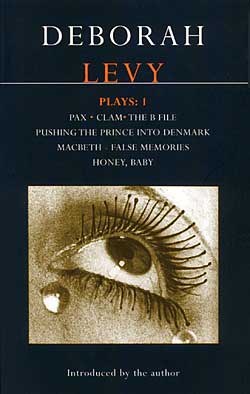
Preface from Levy: Plays 1
In my earliest twenties, I think I believed that theatre could change the world. Later, I discovered that my true interest in the theatre was that it was a place to connect with discomfort rather than prescriptions for how we might live. It took me a while to understand that when theatre uses all the languages that make it a unique form to write for (text, sound, design, lights, the spaces between actors, film and video), it is a place to make visual poetry, a place to show the human nervous system in a state of disquiet - in fact, to show some quite odd behaviour.
The early plays in this anthology, which I have titled 'Cold Wars', deal fairly surreally with aspects of the twentieth century - its holocausts and utopias and shattered dreams. It's strange now to think that I was so young, 23 years old, and felt so deeply about the very real possibility of nuclear war. I hope that future generations reading Pax and Clam will not have that same sense of urgency again.
Pushing the Prince into Denmark, The B File and Honey Baby reflect my interest in turbulent, hybrid cultural and sexual identities. The theatre is an excellent place to explore how we (and particularly women) perform ourselves. Written in the 1990s, they echo much postmodern thinking, with its emphasis on fractured histories and geographies and its liberation from having to be authentic, whole and healed. This was very useful to me, as was theoretical writing that explored similar themes at the time by Julie Kristeva, Hclene Cixous, Homi. K. Bhabha, Stuart Hall, Edward Said. I have rounded up these plays and pushed them under the sub-heading, 'Post-Modern Knots: Identity'.
Macbeth - False Memories, written in 2000, expresses a mood both in myself and I think more generally in the UK - a feeling of being disconnected from any sense of shared values or ideological enthusiasms. I have subtitled this play, 'The Loss of God and Politics' because ultimately it is about a lack of feeling a sort of millennial numbness, perhaps?
I should add that much of my work for the theatre has been both triumphed and trashed by critics. There has never been a calm assessment of what its value might be. I don't know whether this is a good or bad thing - only time will tell. As this anthology goes to press, I have just read an outraged review of Macbeth - False Memories; it says, 'Deborah Levy writes lines like "I haven't washed my pants since my father died." This disgust at death and female hygiene has compelled me to sit down and write a play called Dirty Pants,' which brings me to the last point I want to make in this introduction. I have come to realise that women laugh a great deal more than men, in life and in the theatre. I think all my new plays will be written with this in mind, because unlike my early twenties, when I was serious and scholarly and wanted to please, there is so much laughter inside me.
And I have always wanted the chignon worn at various times by both Simone de Beauvoir and Audrey Hepburn.
Deborah Levy
London, May 2000
Buy this book from Amazon.com or Amazon.co.uk
© Copyright Deborah Levy / ARC Net Ltd Friday, September 10, 2010 All rights reserved
Terms and conditions of use